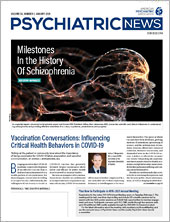An inpatient psychiatric unit is simultaneously a safe haven and a scary place, a dichotomy amplified by the pandemic. This column explores the risks particular to inpatient psychiatric settings during the COVID-19 pandemic, resulting ethical quandaries, and potential creative solutions that may persist beyond this crisis.
As if obstacles to inpatient admission weren’t already extensive, including insurance barriers, bed shortages, stigma, and past traumatic experiences with treatment, now patients may fear psychiatric admission because of COVID-19. Reports of outbreaks in psychiatric hospitals in the United States and abroad reinforce beliefs that the hospital is unsafe.
Unlike medical and surgical units, psychiatric units are organized around the therapeutic milieu, based on the concept that interactions among patients as well as with staff have therapeutic value. How can we maintain a group milieu while isolating potentially infectious patients?
The Substance Abuse and Mental Health Services Administration issued guidance last May about how to mitigate risks for patients and staff to reduce morbidity and mortality while preserving health care system functions. More substantial guidelines have been offered by researchers. A
literature review in
Psychiatry Research by Ermal Bojdani and colleagues about psychiatric care in the United States during the pandemic addresses all venues of psychiatric treatment, including inpatient units.
Strategies for risk mitigation include disease precautions, visitor restrictions, workforce protection, and changes in group therapy and other operations.
The ethical implications of admitting patients to a psychiatric inpatient unit, which some have compared with a nursing home in terms of exposure risk, are considered in that same review. Physical isolation of patients undermines the therapeutic function of psychiatric hospitalization, which relies on human interaction to deliver psychological treatment. Informed consent about this risk is necessary but may be difficult to obtain from a psychotic or cognitively impaired patient.
An excellent double case report by Mario Fahed and colleagues in the American Journal of Geriatric Psychiatry highlights ethical and logistical considerations when caring for older adults on inpatient psychiatric units. The ethical quandaries include evaluating capacity to consent or refuse vital sign monitoring and COVID-19 testing and when to restrict freedom of movement to reduce exposure to other patients. Ultimately, the case report reflects the tension between patient autonomy and protecting public health for everyone on the unit.
Another case study elucidates ethical dilemmas and policy recommendations for when patients refuse COVID-19 testing and won’t comply with quarantine or social distancing precautions on psychiatric inpatient units. In the Journal of Medical Ethics, Mark Russ and colleagues pointed out that physical seclusion, which may be tempting to employ to prevent a potentially infected patient who will not voluntarily comply with mask wearing and physical distancing from infecting others; or physical restraint, which the treatment team may consider to obtain testing samples from an uncooperative patient, are governed by specific state statutes that don’t address risks to others in a pandemic. Furthermore, the physicality of placing someone in restraints increases risk to staff. There are no pat solutions; rather, inpatient treatment teams are wise to wrestle with these dilemmas.
A variety of adaptations has been adopted across the country. The University of Rochester created a COVID-19-positive psychiatric unit so inpatients can benefit from the milieu and group support while also receiving expert medical care. In Colorado, the predominant model is to hospitalize COVID-19-positive psychiatric patients on the medical service and support those patients with telepsychiatry from the consultation-liaison team. Only patients who test negative are admitted to the psychiatry unit, where additional precautions are implemented, but group treatment is possible.
An additional obstacle for inpatient psychiatric hospitals in the pandemic is maintaining adequate staffing because of infection or burnout. Preexisting problems with understaffing and inadequate inpatient beds, which lead to long stays in nontherapeutic emergency departments, have been exacerbated by the pandemic. Scott Zeller has accelerated his pre-pandemic project to create truly therapeutic spaces for psychotic or suicidal patients in emergency departments, with the goal of being able to send 75% to 80% of patients home without inpatient admission. The kinds of adaptations we see happening now may lead to positive changes in inpatient units that will persist beyond the pandemic. For example, a London hospital has instituted point-of-care testing for clozapine levels, which expedited dose titration; enhanced videoconferencing connections with community agencies to facilitate a smooth and efficient discharge plan; and even used telehealth to meet with patients’ family members during rounds. This was reported by Xavier Boland and colleagues in the International Journal of Psychiatry in Clinical Practice.
Inpatient psychiatric services are a crucial component of mental health treatment. Because of the mental health crisis co-occurring with the pandemic, inpatient hospitalization is likely to surge throughout the pandemic and its aftermath. While the challenges that COVID-19 has brought to inpatient psychiatry are formidable, the solutions emerging from this crisis reveal the creativity and adaptability of our colleagues. We don’t have all the answers, but at least we’re identifying important questions to help respond to the needs of acutely psychotic or suicidal patients while containing the risk of infection as much as possible. ■

